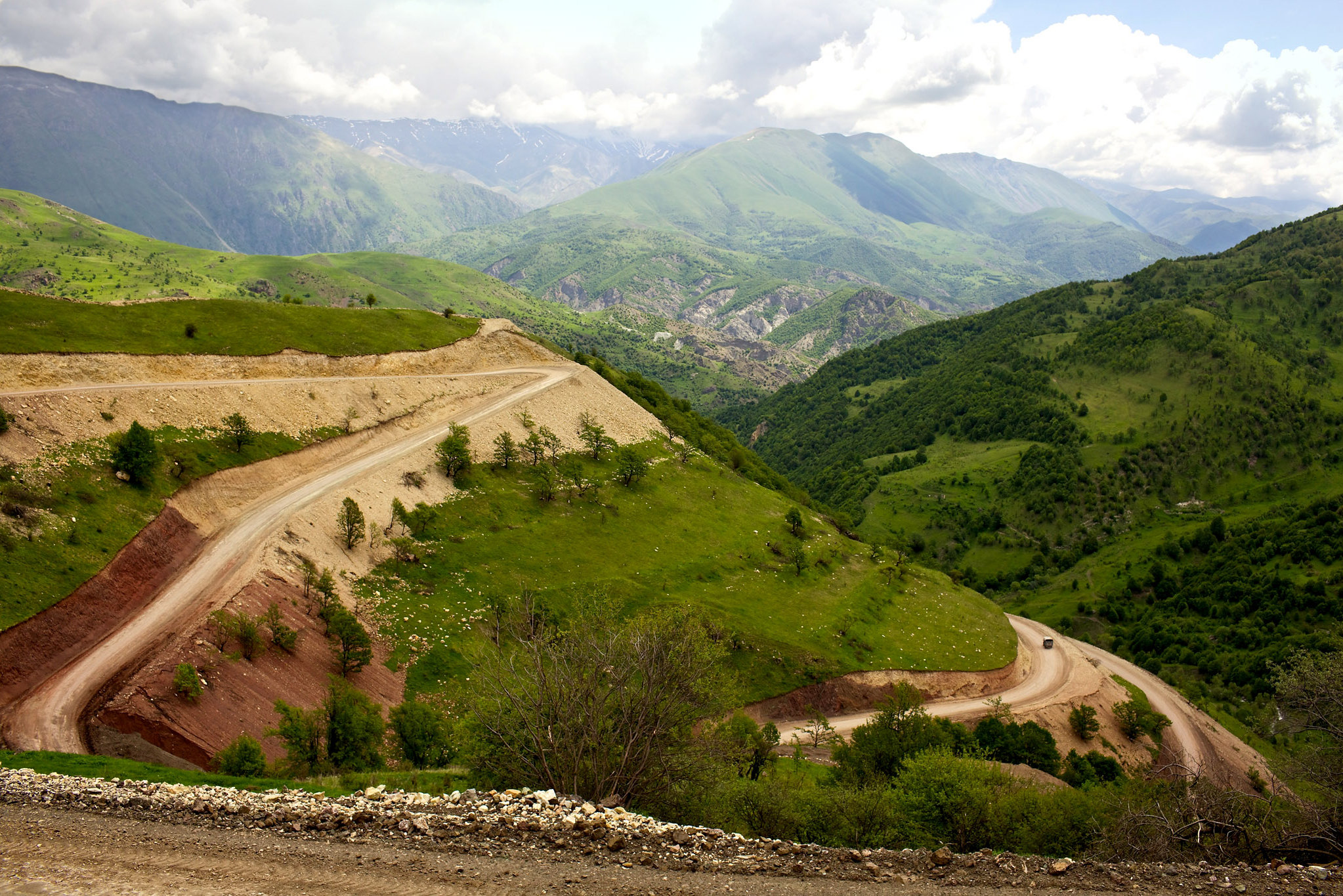The recent failure of Russia’s peacekeeping mission in the South Caucasus underscores the necessity of a clear and robust mandate backed by coalition guarantees and aligned with international principles. Any agreements lacking firm guarantees risk the fate that befell the small Armenian-populated region of Nagorno-Karabakh, which, alongside the collapse of Russia’s peacekeeping effort, vanished from the map two years ago.
Olesya Vartanyan, Expert on Security and Conflicts in the South Caucasus
The final days of Nagorno-Karabakh in September 2023 marked a dramatic conclusion in the region’s three-decade-long cycle of conflict and war. Formally recognised as part of Azerbaijan, but long claimed as an independent republic by its ethnic Armenian majority, the enclave’s fate was sealed in a swift Azerbaijani military operation. Within days, convoys of vehicles lined the only road linking Nagorno-Karabakh to Armenia. The vast majority of the local Armenian population fled, leaving Russian forces to guard ghost towns and abandoned villages.
The failure of the Russian peacekeeping mission in Nagorno-Karabakh carries lessons beyond the South Caucasus region, which lies wedged between Turkey, Iran, and Russia. Examining the missteps offers broader insights into peacekeeping missions elsewhere and provides an urgent warning about ensuring robust security guarantees in future conflict zones – Ukraine among them. The need for enforceable security assurances is not only a geographic parallel but a fundamental requirement for lasting peace.
A Fragile Mandate from the Outset
When Russian peacekeepers entered Nagorno-Karabakh in 2020, their deployment initially symbolised stability. Their arrival marked the end of the bloodiest war in modern South Caucasian history, which lasted six weeks and claimed over 7,000 lives from both Armenian and Azerbaijani sides. The war ended with Azerbaijan regaining control over much of the disputed territory, reversing the outcome of the first conflict in the early 1990s.
The 2020 ceasefire agreement – signed by Armenia, Azerbaijan, and Russia – outlined only a skeletal framework for the peacekeeping mission: its duration, troop numbers, and basic operational conditions, including limited armaments for self-defense. Beyond these points, no comprehensive international mechanism was established to bolster the peacekeepers’ authority or effectiveness.
From the outset, Russia’s peacekeeping presence in Nagorno-Karabakh differed from its other missions across the post-Soviet space. Instead of constructing permanent bases, the troops lived in temporary plastic shelters and fortified their posts with sandboxes – hardly the infrastructure of a long-term stabilising force. Meanwhile, a joint Russian-Turkish monitoring centre oversaw developments via drone surveillance of the mission.
At the same time, Russia’s growing political and economic ties with Azerbaijan raised doubts about its commitment to the peacekeeping effort. The timing of the mission’s deployment coincided with an upswing in Russian-Azerbaijani relations, fuelling suspicions that the operation had been deliberately weakened from the start. In February 2022, just two days before Russia’s invasion of Ukraine, the Azerbaijani president travelled to Moscow to sign a strategic alliance agreement. This pact was seen as a counterbalance to a more significant treaty Baku had signed with Ankara the previous year, but it also laid the groundwork for deeper institutional cooperation between Russia and Azerbaijan – especially in the context of Russia’s own war in Ukraine. This reinforced the perception that Moscow had little genuine political will to protect Nagorno-Karabakh’s ethnic Armenian community.
Despite these geopolitical shifts and limitations of the peacekeepers’ mandate, local Armenians had little choice but to place an immense trust in the Russian contingent, believing it would still offer them a chance to remain in their homeland. Russian-backed reconstruction efforts –
including school repairs, infrastructure development, and demining operations – fostered confidence that the troops would remain for decades. Yet, the absence of a clearly defined international mandate left the mission fundamentally vulnerable.
Unlike standard peacekeeping practices, Russia did not seek an international endorsement or mandate for its mission. The Organization for Security and Co-operation in Europe (OSCE) acknowledged the war’s outcome in December 2020 but made no specific reference to Russia’s peacekeeping presence. The United Nations Security Council did not issue resolutions legitimising the deployment, nor did it consider supplementing Russian troops with an international force – a move that could have bolstered stability, facilitated reconciliation, and attracted post-war reconstruction funding.
By sidestepping international backing, Moscow sought to manage the situation bilaterally, negotiating directly with Baku and Yerevan. This strategy soon faltered when Azerbaijan refused to formalise the mission’s mandate, further eroding its legitimacy. Devoid of a clear legal framework and reliant on Russian diplomacy, the peacekeeping force became hostage to shifting geopolitical realities.
A Mission Paralysed by External Priorities
Moscow worked hard to project an image of a successful mission, employing a dedicated PR team that catered exclusively to Russian media while restricting access to local and foreign journalists. By early 2021, entry to Nagorno-Karabakh became severely restricted for non-Russian and non-Armenian reporters, tightening information control.
However, even the mission’s own reports revealed a growing disconnect between peacekeepers’ operations and the worsening security environment. A comparative analysis of patrol routes and conflict incidents suggests that Russian troops were always monitoring the right locations, but their patrols still failed to prevent escalating tensions – underscoring their inability to enforce stability.

Image caption: Patrol routes from March to August 2022, when Russian peacekeepers intensified their presence in the circled area – a site of several deadly incidents they failed to prevent. Darker shades indicate more frequent patrols. Based on daily report maps from the Russian peacekeeping mission. Created by the author.
Russia’s mounting distractions elsewhere proved decisive. As the war in Ukraine escalated, Moscow increasingly diverted resources and political attention away from the South Caucasus. With Azerbaijan possessing the region’s strongest military and emboldened by its 2020 victory, Russia found itself unable or unwilling to challenge Baku’s creeping advances in Nagorno-Karabakh.
By late 2022, the mission’s operational scope had dramatically diminished. Escort missions for Armenian farmers working near military positions were curtailed. Protection for religious pilgrims visiting historic Armenian churches ceased. Humanitarian aid dwindled, leaving Russian peacekeepers distributing mostly diaspora-sponsored supplies from Armenian communities in Russia.

Image caption: Decline in Russian peacekeeper escorts for local Armenian farmers before and after Russia’s invasion of Ukraine, leaving the mission unable to address the worsening security situation in Nagorno-Karabakh. Based on daily reports until the mission’s withdrawal. Created by the author.
The Collapse of Russian Peacekeeping
The mission’s impotence became undeniable when, in autumn 2022, Azerbaijani forces seized control of the only road connecting Nagorno-Karabakh to Armenia. Russian peacekeepers, once considered the route’s guarantors, stood by as Azerbaijan implemented a nine-month blockade, strangling the region’s supplies and culminating in a one-day military offensive that ended Armenian habitation in the enclave.
Following Azerbaijan’s victory, Moscow sought to shift blame onto Armenia, which had attempted to engage Western mediators as the security situation deteriorated. Yet, since Russia had unilaterally deployed its peacekeepers, Western countries and international organisations had no immediate leverage over events in Nagorno-Karabakh, nor could they intervene without Baku’s consent. The European Union could do little beyond dispatching a civilian monitoring mission to Armenia after Azerbaijan launched cross-border attack in September 2022.
The final act of the mission’s failure was marked by the deaths of several Russian peacekeepers, including their deputy commander, during Azerbaijan’s concluding September 2023 offensive. Unlike in 2008, when Moscow responded to the deaths of its peacekeeping troops in South Ossetia with full-scale military intervention in Georgia, Russia swiftly accepted Baku’s apology and moved on. In a year, a monument to the fallen peacekeepers appeared outside the mission’s headquarters, shortly before the last Russian troops quietly withdrew from a region where they no longer had a purpose.
Lessons for Future Peacekeeping Efforts
The fate of Russia’s peacekeepers in Nagorno-Karabakh illustrates a broader truth: agreements, no matter how powerful the leaders who broker them, can swiftly unravel if they lack binding guarantees from a coalition of states and international organisations. Without such safeguards, peace deals become hostages to geopolitical shifts and risk degenerating into a prelude for renewed conflict, mass displacement, and deepening protracted conflict.
For those crafting security arrangements in Ukraine and beyond, the failure in Nagorno-Karabakh stands as a stark warning. The absence of credible guarantees invites catastrophe. The price of neglecting this lesson is measured in lives lost, generations displaced, and conflicts that refuse to end.
Olesya Vartanyan is a conflict analyst with over 15 years of experience in the South Caucasus, specializing in managing research, advocacy, communications, and donor relations. She most recently served as Senior Analyst at the International Crisis Group, where she led research on security issues in Armenia, Georgia, and Azerbaijan, with a specific focus on conflict zones.

